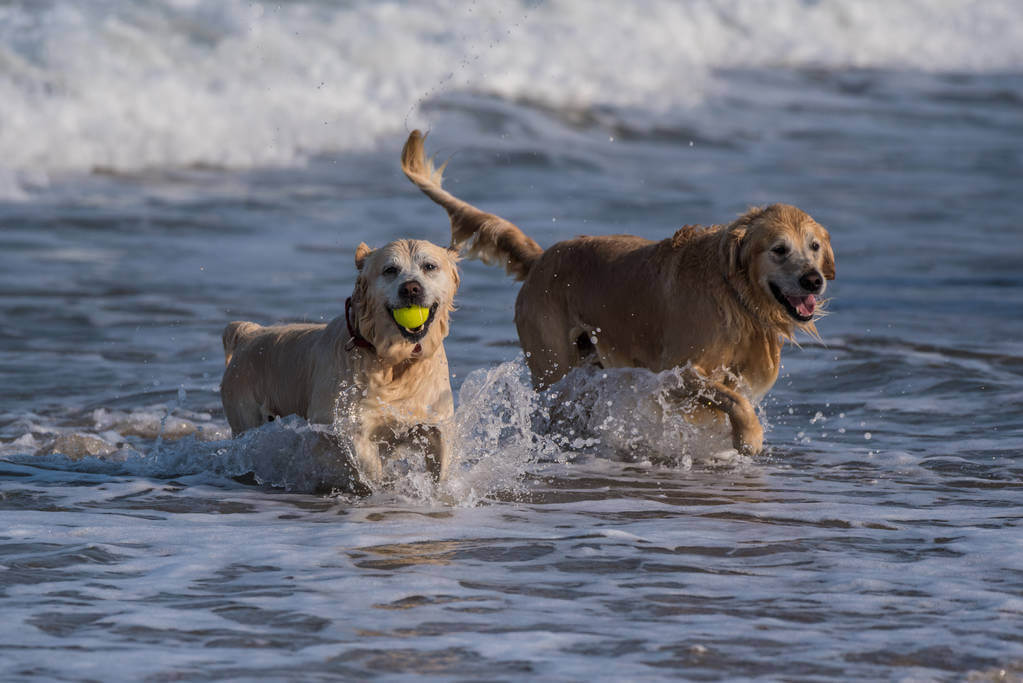Not All Dogs Are Born Knowing How To Swim
Many dogs, if placed on the surface of the water, will auto-start their dog paddle in the air. They see the water and their legs wag in that familiar motion. It seems all you need to do is put them in and watch them go.
Many people believe all dogs are born with the instinct to swim. This can be a fatal misconception.
There are three types of dogs: dogs that can swim, dogs that can swim but need help, and dogs that have the unique ability to sink like a rock in any water environment.
Our Top Picks
Natural Born Swimmers
Certain dogs are bred for water rescue and activity. Not only are these breeds usually excellent swimmers, but they also tend to thoroughly enjoy the water.
Water-loving breeds include retrievers and spaniels such as the Labrador Retriever, Golden Retriever, American Water Spaniel, Irish Water Spaniel and Portuguese Water Spaniel.
Retrievers and Spaniels have strong, long legs that are perfect for swimming.

If you haven't already tested their swimming ability, always start your dog off slowly. Supervise them, starting in shallow water where they can stand and then moving to deeper water.
Remember, even strong swimmers can get lost, pulled out by the current, injured, or fall off the boat and find themselves unable to stay above the surface. All dogs can benefit from a dog life jacket when they are near the water. (click here to find best dog life vest)
Dogs That Need Help Swimming
Other dogs may have an innate ability to swim, but this does not mean that they are safe in the water or able to stay afloat. Some dogs of the breeds mentioned above may fall into this category, despite their innate ability.
Smaller breeds, such as Chihuahuas and Maltese, can swim, but may quickly become overwhelmed by the vastness of the water.
If overwhelmed, these types of dogs can quickly tire themselves out. They may also panic and desperately try to climb onto anything - including you - to get out of the water.
If your dog has the physical ability to swim but not the courage, you can slowly introduce them to the idea of swimming.(click here to learn how to teach dog swim)
Reward your dog for every attempt they make in the water, even if it's just getting their paws wet. As your dog becomes more comfortable in the water, they will swim more easily in deeper areas.
Being with another dog who likes to swim may also encourage your apprehensive pup to venture into the water.
Land Dogs That Won't and Don't Want to Learn
- Dogs that are low in stature and have a solid undercarriage such as pit bulls, dachshunds and boxers have difficulty staying afloat in the water because of their short legs.
- Dogs with short faces and short noses, such as pugs, have poor stamina, low lung capacity and get tired easily, making swimming a more dangerous sport for these dogs.
- Small dogs such as Chihuahuas, Maltese, etc. can sometimes be excellent swimmers, but they are afraid of the cold, easily frightened, so they are also prone to drowning.
These breeds should be under constant supervision near anybody of water.
Not that these types of dogs cannot enjoy a beach day with their families. Breeds that can't swim can still play on the beach in shallow water and even hang out with you in the pool on large floating objects! (click here to find dog friendly beach)
But even if your dog has the swimming ability of Michael Phelps, that doesn't mean you can forgo safety precautions.
If you're in a lake or an area with jagged edges and hot sand, buy some puppy swimming gear, such as a dog life jacket. And make sure someone is supervising dogs swimming in the water at all times.
Keep clean drinking water available, and for your dog to relax after any water exercise.
Final Thoughts
If your dog is a breed that isn't suited to the water but doesn't fear it, you can put a life jacket on them and place it carefully and gently to prevent possible drowning; if your dog is the type that hates water, you can put a mat by the pool for them to sunbathe with you. Is your dog afraid of water? Have you tried to train them to be better swimmers? Let us know your training methods in the comments below!


Leave a comment